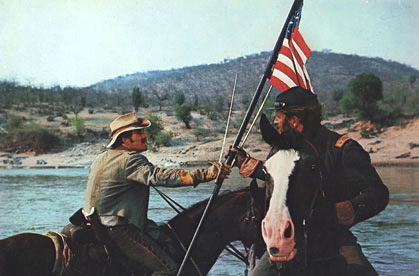
Although my Dad was a Navy man and not a big John Wayne fan, he loved those old John Ford cavalry Westerns. There was an element of wonderful rich fantasy of men living and working together when men and officers would mount up together and we would hear the stout male chorus, which may have been meant to literally be the voices of the men we're seeing ride (usually in backlighting to put them in strong relief), or it may be their spiritual voices singing the joy of this life of shared service and sacrifice. I liked the fantasy, too, and I think it is a tragedy of my generation that we were not compelled to experience that life.
I guess Sam Peckinpah resented the fantasy, because in Major Dundee (1965), he set out to expose it as a hollow fraud. Or maybe he just figured that story had been told and that there were other stories to tell. Dundee feels like a sour fantasia on Fort Apache, both films featuring martinet renegade commanders dealing with threatened Indian attack. Dundee begins with a massacre scene that at the time may have seemed out of The Searchers, but in a few years would seem like an echo of My Lai.
OK, so we're launched into a story of the search for three missing children. Except that the mission led by super-straight, squared jawed Moses Heston as Dundee requires the participation of a disaffected Confederate war prisoner (the Civil War is still going on) played by heavily-mascaraed-Piccadilly-Circus-fop Richard Harris. Then the Indians give back the kids but the Major decides to pursue revenge anyway, pushing into Mexico. Then the Major gets hurt and goes on a bender and has to be retrieved by the potentially disloyal Confederate officer. They handily beat the Indians, but nearly get their butts kicked by the French Foreign Legion, whom they had foolishly crossed earlier in the story. The film has so many story lines (I left out a few, including a half-hearted romance), that it feels like an anthology.
Everyone who writes about the film notes that it is a mess. Some say this may merely have been a reflection of the conditions under which it was produced. But it seems strongly possible that the mess was built into the very conception of the project.
What holds the film together is the disintegration of Dundee's character. And by Dundee's character, I mean both that he loses his grip on reality and therefore on his own identity, AND that he demonstrates less and less good character, with regard to simple human decency (made all the more remarkable because it's happening to good old Charlton Hur). By the end of the film, the mission has lost its mission and plunges ahead without any clear definition of victory or even how to get out. In 1965, none of this was evident in Indochina. Escalation was the watchword, and stalemate would not appear inevitable for another three years.
Prescience or coincidence? On such coincidences, artistic reputations are made.





No comments:
Post a Comment